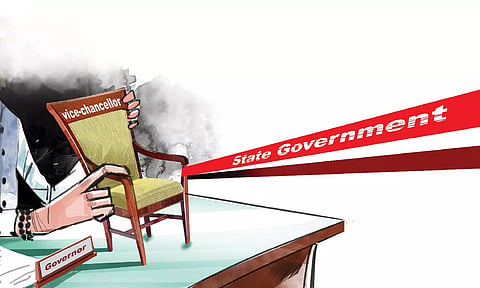

CHENNAI: The political tug-of-war between the State government and Governor RN Ravi over various issues, including the appointment of Vice-Chancellors to State-run universities, has caught the institutions in the crossfire, prompting academicians to raise concerns about the impact the slugfest would have on the higher education sector in Tamil Nadu.
The appointment of Vice-Chancellors is a bone of contention between governments and Governors in several states, including Tamil Nadu. The government had approached the Supreme Court against the Governor, who suggested reconstituting search committees to choose Vice-Chancellors of the University of Madras, Bharathiar University, and Tamil Nadu Teachers Education University.
As per the University Grants Commission’s (UGC) 2018 regulations, the search-cum-selection committees constituted to appoint Vice-Chancellors should have a member nominated by the UGC chairman.
Citing this, the Raj Bhavan sought the inclusion of a representative from the regulation – in addition to representatives of the Governor/Chancellor, State government, senate and syndicate of the university concerned, in the panel formed to pick VCs for these three universities.
However, the Tamil Nadu Universities Laws (Amendment) Act, 2017, mandates the constitution of a committee with only three members: State government representative, and senate and syndicate nominees of the respective university.
A senior official from the Higher Education Department said the Governor’s insistence on reconstituting the search committees by including UGC representatives was contrary to the provisions of the State law. “According to the law, the Governor cannot appoint search committee members to pick Vice-Chancellors of State-run universities,” said the official.
He also pointed out that the State Assembly had in 2022 adopted Bills empowering the government to appoint VCs to the 13 State-run universities. The legislations were forwarded to the Governor, who, however, has not given his assent till now. That is why the State government has moved the Supreme Court, the official said.
In the petition that it filed before the Apex Court, the State government challenged the Governor’s notification with regard to the appointment of Vice-Chancellors to Bharathiar University, Tamil Nadu Teachers Education University and the University of Madras.
The issue became even more complicated after the UGC sent an official communication to the Higher Education Department in October 2023 expressing its concerns on the constitution search-and-selection committees without including a nominee from the Commission chairman. UGC chairman Mamidala Jagadesh Kumar said one representative of the selection panel shall be nominated by the Commission for selection of VCs of State, private and deemed-to-be universities.
Rejecting the Governor’s notification, noted academician and former Vice-Chancellor of Anna University E Balagurusamy said, “The Governor has no special powers to reconstitute the search committee for appointing Vice-Chancellors. I spoke to the Governor about this issue.” According to him, the delay in appointing Vice-Chancellors would affect higher education.
Even as he opined that the move to include UGC members in the search panel could help reduce political and other interference while choosing VCs, Balagurusamy noted that the legal provisions that exist today does not permit that.
Governor Ravi should accept the existing rules and conventions followed while constituting search committees, as being the Chancellor does not give him any special power or authority to appoint his own search panel, he said. A search committee would come to life only after the State government issued an order, the former vice-chancellor said.
“The Tamil Nadu Universities Laws (Amendment) Act has to be amended with the help of the State government. Only then can the search committee could be reconstituted,” he added.
According to P Thirunavukkarasu, former president of the Association of University Teachers (AUT), the existing State Act was good and there was no need to amend it for appointing Vice-Chancellors. “It is also not necessary to include a UGC member in the search panel, as State representatives have all the qualifications to select the head of a university,” he argued.
This confrontation between the Raj Bhavan and Fort St George has already taken a toll on academic matters, which puts students and faculty at the receiving end. For instance, in the absence of Vice-Chancellors, the students’ convocations could not be conducted on time while there are fears that the issuance of degree certificates could also be delayed, Thirunavukkarasu said. Also, said the professor, the appointment of new faculty members would also be delayed if the university does not have a Vice-Chancellor.
“Similarly, salary disbursement to the temporary staff will be delayed, and the Vice-Chancellor’s signature is required to get central funds,” he said, adding that even day-to-day administrative work would also be affected.